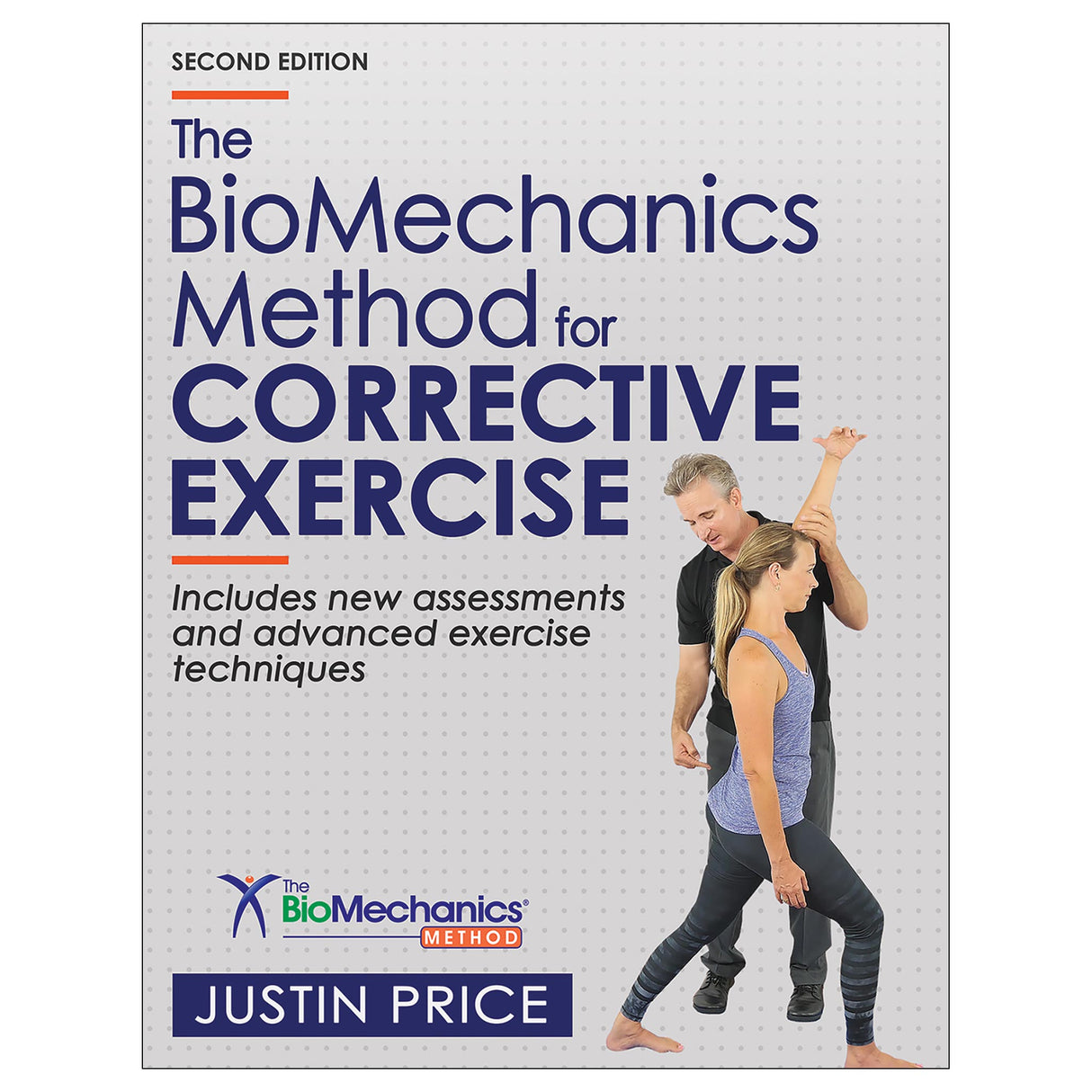The BioMechanics Method for Corrective Exercise 2nd Edition Ebook With HKPropel Online Video
Author: Justin Price
$97.95 CAD

Many people suffer from musculoskeletal and movement issues that cause pain and discomfort when performing even the simplest forms of physical activity. The BioMechanics Method, created by corrective exercise expert Justin Price, enables fitness professionals, strength and conditioning specialists, athletic trainers, and physical therapists to correct underlying imbalances so their clients and patients can resume movement pain-free. The BioMechanics Method for Corrective Exercise, Second Edition, provides a systematic approach for applying effective corrective exercise strategies to assess and address muscle and joint pain and movement dysfunction. You will learn to do the following:
- Identify and assess common musculoskeletal imbalances and movement impairments
- Recognize how those imbalances and impairments affect different structures of the body
- Apply various types of corrective exercises
- Implement the appropriate exercise strategies for a client’s circumstances
- Design a corrective exercise program that addresses the underlying cause or causes of musculoskeletal and movement issues
Readers will also have the opportunity to observe the application of many assessment and exercise techniques via 36 online videos. The included corrective exercise library contains more than 65 self-myofascial release, stretching, and strengthening exercises along with suggestions for exercise progressions and regressions. Each technique is supplemented with full-color photos, and additional illustrations and tables aid with proper execution.
The second edition features two entirely new sections that deliver important corrective exercise skills. Part VI explains how to progress from structural assessment to movement analysis for the feet and ankles, knees, hips, spine and shoulders, and neck and head. Part VII demonstrates how to integrate advanced corrective exercise strategies into clients’ programs to address 13 common movement impairments.
Practical advice and useful tools that further enhance professional competency include strategies and examples for communicating with clients to facilitate effective consultations and proper cuing for both the assessments and exercises. Skill acquisition activities and self-checks in every chapter allow readers to practice the real-life application of their techniques. Case studies demonstrate how the entire process can be implemented, from assessment to program design.
To help you capitalize on the specialized skills outlined in this text, the final section of the book explains how to create and manage a corrective exercise business. It covers information on networking and referral systems, tips for staying within scope of practice, and marketing and promotion methods for attracting and retaining clients.
The strategies and techniques in this book, proven successful by thousands of The BioMechanics Method corrective exercise specialists, will enable you to develop distinctive musculoskeletal assessments and corrective exercise skills that can swiftly eliminate pain and improve physical function for your clients.
Note: A code for accessing online videos is included with this ebook.
Audience
Allied health and fitness professionals, including personal trainers, athletic trainers, physical therapists, personal trainers, and strength and conditioning specialists; also a supplemental text for courses in therapeutic exercise, rehabilitation, and corrective exercise.Part I. Fundamentals of Structural Assessment
Chapter 1. The Process of Structural Assessment
Chapter 2. Assessing the Feet and Ankles
Chapter 3. Assessing the Knees
Chapter 4. Assessing the Lumbo-Pelvic Hip Girdle
Chapter 5. Assessing the Thoracic Spine and Shoulder Girdle
Chapter 6. Assessing the Neck and Head
Part II. Understanding Muscles and Movement
Chapter 7. Anatomy in Real Life
Chapter 8. Functional Anatomy of the Feet and Ankles
Chapter 9. Functional Anatomy of the Knees
Chapter 10. Functional Anatomy of the Lumbo-Pelvic Hip Girdle
Chapter 11. Functional Anatomy of the Thoracic Spine and Shoulder Girdle
Chapter 12. Functional Anatomy of the Neck and Head
Chapter 13. Fascia
Part III. Fundamentals of Corrective Exercise
Chapter 14. Elements of Corrective Exercise Programs
Chapter 15. Self-Myofascial Release
Chapter 16. Stretching
Chapter 17. Strengthening
Chapter 18. Static Postural Considerations
Part IV. Complete Corrective Exercise Library
Chapter 19. Self-Myofascial Release Exercises
Chapter 20. Stretching Exercises
Chapter 21. Strengthening Exercises
Part V. Corrective Exercise Program Design
Chapter 22. Building Successful Client Relationships
Chapter 23. Conducting Consultations
Chapter 24. Structuring Sessions and Programs
Chapter 25. Sample Sessions and Program
Part VI. The Fundamentals of Movement Analysis
Chapter 26. The Process of Movement Analysis
Chapter 27. Movement Analysis of the Feet and Ankles
Chapter 28. Movement Analysis of the Knees
Chapter 29. Movement Analysis of the Hips
Chapter 30. Movement Analysis of the Spine and Shoulders
Chapter 31. Movement Analysis of the Neck and Head
Part VII. Corrective Exercise Strategies
Chapter 32. Targeting Movement Impairments
Chapter 33. Corrective Exercises for Movement Impairments
Chapter 34. Program Design for Movement Impairments
Appendix A. Blank Client Assessment Diagram
Appendix B. Blank Movement Analysis Form
How do the foot and ankle muscles affect the most common musculoskeletal deviations in the human body?
How the feet and the ankles relate to the knees
The BioMechanics Method movement analysis process
 Shoulder blade positioning
Shoulder blade positioning Hip flexor groups
Hip flexor groups Client Assessment Diagram from case study client
Client Assessment Diagram from case study client Shoulder flexion impairment
Shoulder flexion impairmentThe author of The BioMechanics Method for Corrective Exercise, Justin Price, has developed a suite of instructor ancillaries that include sample syllabuses, instructor guides, PowerPoint slides, assignments and activities for students, a test bank, and an image bank. These ancillaries are free to adopting instructors.
More information about these ancillaries can be found at www.thebiomechanicsmethod.com/teacher-resources/#ancillary-support-materials.
To view a sample of the ancillaries or gain full access, please email InstructorSupport@thebiomechanicsmethod.com.







